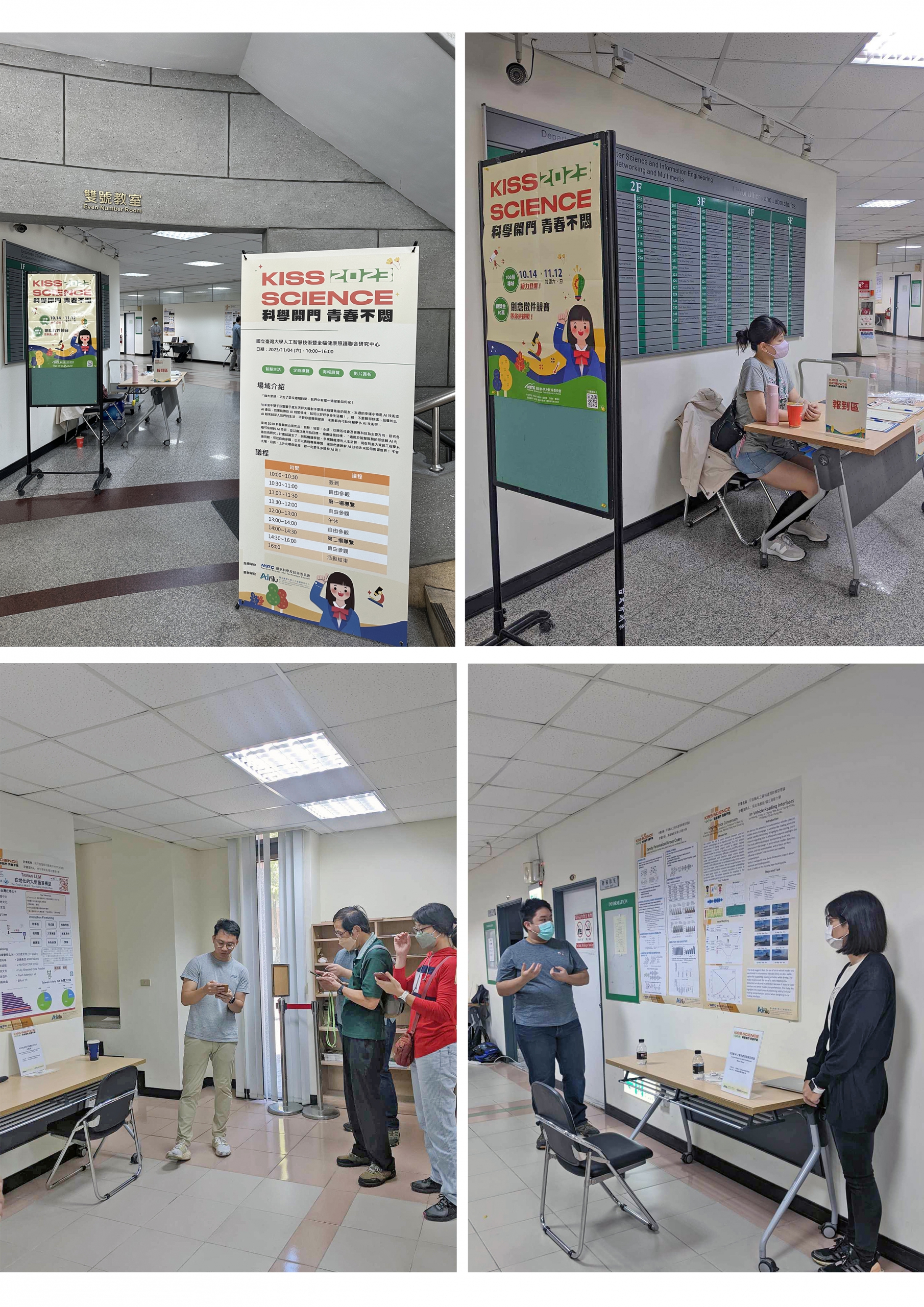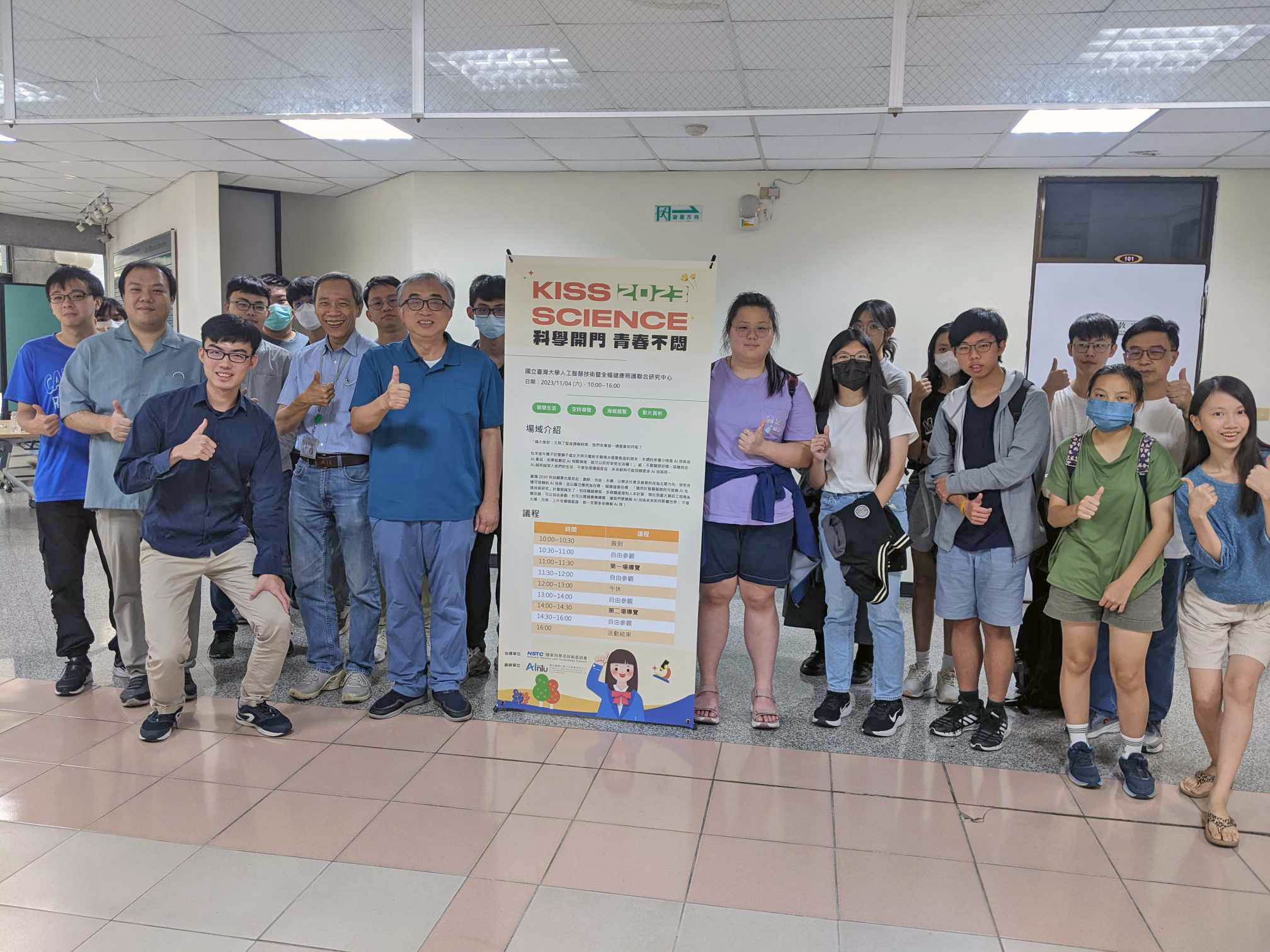Kiss Science 2023 ─ 科學開門,青春不悶
Kiss Science 2023─ 科學開門,青春不悶活動
📌地點:臺灣大學資訊工程學系德田館(106臺北市大安區羅斯福路四段1號)
照片



Kiss Science 2023─ 科學開門,青春不悶活動
照片



臺大AI中心主辦第六屆 「Google AI BootCamp 創新研究營 2023」
📌日期:2023.08.17
📌地點:臺灣大學德田館
自從2018年開始,臺大AI中心每年與Google共同舉辦「AI創新研究營」,第六屆活動將於2023年8月17日以實體方式舉行,主題為近期有大幅突破的 Large Language Models 以及Google Research Collaborations 分享合作研究的形式與成果。
本次堪稱是Google講者來臺技術層級最高,共邀請到 Google 的大語言模型研發團隊的6位專家,與臺灣學研團隊進行前瞻技術分享交流。
同時也邀請執行 Google University Relations 合作計畫的教授進行案例分享,藉此促進產學對話,尋求更多的合作研究機會。
活動逾 320 人報名參加,現場交流熱烈。
議程請參考連結
照片:

上圖:活動現場

上圖:長官合照

上圖:大合照

上圖:活動現場

歡迎踴躍報名2023 AI 創新研究營 AI BootCamp!
自從2018年開始,臺大AI中心每年與Google共同舉辦「AI創新研究營」,第六屆活動將於2023年8月17日以實體方式舉行,主題為近期有大幅突破的Large Language Models 以及Google Research Collaborations分享合作研究的形式與成果。
本次堪稱是Google講者來臺技術層級最高,共邀請到 Google 的大語言模型研發團隊的6位專家,與臺灣學研團隊進行前瞻技術分享交流。另外也透過合作案例的分享,藉此促進產學對話,尋求更多的合作研究機會。
📌2023/08/11更新議程,請參考連結
📌線上報名:報名已截止
📌EDM2023 AI創新研究營
活動注意事項
● 本次活動報名完成不等於活動錄取, 審核通過者將於報名截止後一周內收到錄取通知的電子郵件。
● 與會者於活動全程禁止拍照、錄影、錄音。主辦單位將進行拍攝,其影像僅提供日後教育推廣及成果紀錄使用。
● 國際會議廳禁止飲食,因生理需求喝水除外。
● 為維護場地清潔,活動結束時請協助將垃圾攜出。
防疫措施說明
● 因國際會議廳空間較為密閉,建議全程配戴口罩。
● 報到處提供酒精消毒設備,可多加使用。
● 若有呼吸道症狀者、額溫超過攝氏37.5度者,建議盡速就醫請勿入場。
※臺大AI中心所收集的姓名、電子郵件等個人資料,僅供活動報名依據,及事後活動成效分析之用,並不做其他用途※
※ 主辦單位保有最終修改、變更、活動解釋及取消本活動之權利※
活動聯絡人:aintu@ntu.edu.tw
主辦單位:
臺大人工智慧技術暨全幅健康照護聯合研究中心AINTU
臺大與Google深化合作!共推半導體、AI技術研究
📌日期:日期:2023.05.04
📌原文【連結1】【連結2】
臺灣大學今(4日)宣布和Google 有更深的合作,除現有電機、資訊、機械等領域,將擴大到半導體、晶片設計、永續發展及AI技術範疇,並增加更多元的合作形式,包括研究獎助、知識產權共享。
臺大與Google在AI、機器學習、電腦視覺、自然語言處理、半導體等領域,均有世界級的研究團隊。近年來,雙方透過臺大人工智慧研究中心(AINTU)居中協調,順利推動多項產學交流合作,不斷提升師生學術能量,創新研究成果。
其中臺大和Google在2018年共同發起「AI創新研究營」,臺大指出,目前五屆已累積超過60位來自各國的Google專家進行分享,逾1500位參加者,今年主題將聚焦在雙方在人工智慧領域的研究合作,包含當下熱門 AI 領域交流,如大型語言模型等。
臺大副校長廖婉君表示,臺大是國際一流大學,而Google在搜尋引擎、雲端服務及開源軟體方面,影響力遍及世界各角落,雙方無論是在人才培育、學術研究、產學合作及永續發展等主題,都有共識一起合作推動,特別是人工智慧、半導體、及環境永續等,都是未來合作的重要方向。
而Google 過去幾年以多種方式挹注臺大資源,贊助學生參與國際學術活動,提供學生企業實習機會,贊助年輕教師進行研究,鼓勵女性族群。期待雙方未來有更長遠、更多元深化的合作,共創雙贏。
Google臺灣董事總經理馬大康博士則表示,很開心能持續推動大專院校交流,協助年輕學子提升研究和實務專業知識,並透過Google大學交流計畫、AI 創新研究營和半導體研究計畫等高階技術研究合作,深化台灣產學界在關鍵技術領域交流,感謝台大在各計畫的大力支持,期許產學界能共同邁步向前,協助台灣推動先進科技發展,落實智慧台灣願景。
跨域融合・臺灣AI新局
📌日期:2023.03.28
📌原文:連結
人工智慧 (AI) 技術的蓬勃發展,已深入各行各業、改變民眾日常生活,對人文社會帶來深遠影響。為引導AI成為人民信賴且有益於社會的力量,國科會推動臺灣人工智慧卓越中心 (Taiwan AI Center of Excellence,簡稱Taiwan AICoE),做為跨部會整合及國際合作平台,根基於科研技術、人才培育、AI治理等三大策略目標,銜接國內現有人工智慧研究基盤,並遵循「以人為本」、「永續發展」、「多元包容」等價值觀,協調各部會提升資源之投入綜效,特於今(28)日舉辦「臺灣AI展望與布局記者會」,邀請產官學研各界代表,攜手合作、接軌國際,共同引導及推動朝台灣可信賴AI的發展,善用AI技術來為人類社會福祉創造正面影響,實現「AI for Better Life」。
以人為本推動AI 接軌國際規範與價值觀
行政院政委兼國科會主委吳政忠表示,國際社會逐漸追求符合人權、基本自由及共同民主價值等基本原則,落實於AI的發展與使用上,以契合經濟合作暨發展組織(OECD)所提出的「人工智慧原則(AI Principles)」,與聯合國的「永續發展目標(SDGs)」。為落實國內以人為本的AI發展,確立資料治理規範與AI倫理價值,國科會已於108年頒布人工智慧科研發展指引,引導國內科研人員有所依循,進一步積極研議共通性AI研發與應用倫理準則,跨部會合作推動臺灣AI倫理法制化,並與全球AI倡議接軌,將臺灣價值觀帶入國際規範,提升臺灣於全球AI治理的制度影響力。
立基AI國力 擴大台灣AI影響力
臺灣擁有世界級半導體產業的硬體實力,結合優質AI科研能量、研發人才等軟體技術,接軌全球AI新興關鍵技術是極具競爭力的。為拓展國際合作之整體策略布局,以Taiwan AICoE作為國際合作平台,提升交流層級,並根基於三大策略目標,在科研技術面向,強化AI核心科技國際合作;在人才面向,鏈結AI頂尖國際機構及學者建立亞太人才樞紐;在治理面向,參與以人為本AI國際組織,並與價值觀相近國家建立可信賴AI夥伴關係。由上而下引導國際合作策略布局,聚焦重點國家、領域、機構的對接與合作,建立跨部會合作平台並介接專業社群,共同擴大台灣AI國際影響力。
以國家高度 布建可信賴AI國際對話平台
近期生成式AI開始蓬勃發展,為AI科技注入嶄新希望與超乎想像的應用,其技術演變與所衍生的風險,將對人類社會造成結構性衝擊。Taiwan AICoE將匯聚產官學研能量,主動布局新興關鍵科技及發展要素,並多元介接政治、經濟、社會學、人類學、哲學等面向,落實以人為本的AI根基,以厚植可信賴AI卓越研究能量為目標,型塑臺灣成為國際級AI研發聚落,回應國家與全球重大挑戰,打造臺灣成為全球AI新銳。
上圖:啟動儀式合影左起為華碩雲端吳漢章總經理、所羅門陳政隆董事長、叡揚資訊張培鏞董事長、數位部李懷仁次長、中山大學鄭英耀校長、國科會吳政忠主委、台灣AI晶片聯盟盧超群會長、中華民國資訊軟體協會沈柏延理事長、義隆電子葉儀皓董事長、AICoE蔡志宏總召及AICoE許永真副總召
臺大AI中心與工研院共同主辦 「可信任 AI 國際論壇 (Trustworthy AI Summit)」
📌日期:2023.01.11
📌地點:臺大醫院國際會議中心
人工智慧(AI)的技術和效能已廣泛應用於不同領域,因此,可信任AI成為全球高度重視的議題,應具備「公平性」、「當責性」與「透明性」等要素,使AI 透明化讓演算法更安全、更公正。邀請美國 IBM Research AI 多位專家、前任美國 NSF IIS Director、以及台灣學者分享專業經驗,共同探討可信任AI發展趨勢,提升AI的強健性與可學習性。論壇總共 9場專題演講以及1場專家座談。
活動現場約 150 人參加,交流熱烈。
Special Guests:
Prof. Jane Yung-Jen Hsu (許永真教授), National Taiwan University (Vice Chair, Taiwan AICoE, NSTC)
Dr. Aleksandra Mojsilovic, IBM Research Fellow, Head of Trustworthy AI
Prof. Jiun-Haw Lee (李君浩教授), Associate VP for International Affairs, National Taiwan University
講者:
Dr. Michael Hind, Distinguished Research Staff Member, IBM Research AI
Prof. Shou-De Lin (林守德教授), National Taiwan University
Prof. Wei-Chung Wang (王偉仲教授), National Taiwan University
Dr. Tsuyoshi Ide, Senior Technical Staff Member, IBM Research
Prof. Shan-Hung Wu (吳尚鴻教授), National TsingHua University
Dr. Jiri Navratil, Principal Research Staff Member, IBM Research
Prof. Wei-Shinn Ku (顧維信教授), Auburn University (former Program director of CISE/IIS Division, NSF)
Dr. Pin-Yu Chen, Principal Research Staff Member, IBM Research AI
Prof. Cheng-Te Li (李政德教授), National Cheng Kung University
議程:

上圖:大合照

上圖:座談

上圖:AICoE許永真副總召
📌地點:現場 ( 臺灣大學梁國樹會議廳, 需事先報名)及同步線上直播
📌日期:2022.07.07~07.08
📌地點:現場 ( 臺灣大學梁國樹會議廳, 需事先報名)及同步線上直播
臺大AI 中心與Google 每年合作舉辦「AI 創新研究營」,邀請Google 與臺灣學者分享最新的AI 技術進展與應用成果。


報名連結(報名已截止):
跨域應用AI技術 臺大人工智慧中心展現前瞻研發新量能
📌日期:2021.11.30
📌原文:連結
近年數位轉型與AI技術蓬勃發展,是各個產業關注的議題。而一個技術從研究開發到實際的產業應用,需要多方的合作與投入。協助跨領域技術與產業順利連結,是臺大AI中心的重點目標之一,為促成產學交流與合作,臺大AI中心於110年11月26日(五) 舉辦線上「臺大AI中心暨轄下計畫成果發表會」。此次由中心轄下AI核心技術及醫療照護領域的研究團隊,透過技術講演及海報展示,分兩個場次發表多項前瞻研究成果與應用方向。
在AI核心技術場次中,電腦視覺與多媒體類別研究團隊結合眾多技術,已生成相關落地應用於視訊監控與醫學影像、手機晶片與製造,與銀行及輿情分析產業等。其中,臺大陳祝嵩教授團隊所訓練的永續終身學習(CLL)模型應用在工業的瑕疵檢測上,能將所有的瑕疵辨認整合在同一模型進行,可達到增加新的偵測目標而不影響原本的辨識率。
此外,陳祝嵩團隊所開發的Audio visual語音增強技術,透過灰階化、降解析、自編碼等多重手法,讓影像處理成本降至與音訊處理相當,並確保流程中影像無法還原,但仍可保持優異效果,在影像資料分享的過程中同時兼顧效能及隱私。
清大林嘉文教授團隊利用深度學習研發出半導體製程EDA工具,可以早期預測光刻製程所產生的電路失真及光罩修正,可應用於IC 製程之佈局圖評估、IC 瑕疵、熱區預測,及光罩優化等。這是全世界第一套以電腦視覺準確預測光刻製程對晶圓線路所產生的失真之技術,大幅超前目前EDA設計工具,可望造成半導體製程EDA之典範轉移。
AI晶片、硬體設計與通訊類別研究團隊也開發出多項實用技術。元智大學方士豪教授研究團隊開發之毫米波雷達動態感知技術,可在有隱私疑慮的遠距居家照護機構場景,用於偵測跌倒事件發生、或是監測臥床者之生理指數,降低照護者之負擔。
目前離線聲控裝置不易達到大字彙的關鍵字語音辨識,方士豪團隊研發出個人化語音增強技術,可在離線狀態下消除語音訊號中的雜訊,提升關鍵字辨識率,可應用於家電及家庭照護等語音控制裝置。
另外,如何將需要大量計算的AI技術在終端裝置實現,可高度平行化處理的通用繪圖處理器(GPGPU)是一個未來方向。成大陳中和教授團隊自2013年起規畫開發的CASLab GPU,目標是打造出第一顆國內自製的SIMT運算型GPU。
透過優化的編譯流程,使軟體堆疊更能配合硬體的運作,大幅提升整體效能,且提供開源的開發執行環境。軟體層無論OpenCL Runtime、Compiler都是以C語言開發,可以搭配在Arm、 RISC-V等常見的CPU平台上運作。這項技術也已開始技轉多家廠商,快速為MCU升級AI能力。
在這個連網智慧服務的時代,人們已習慣使用網路服務,近年來產業界也大量在第一線使用AI智能客服。若要達到精準應對,大範圍的知識庫是不可或缺的。在自然語言與情緒運算類別中,中研院馬偉雲教授團隊開發的獨特知識表達模式,將原本的常識 (廣義知網E-HowNet) 附加知識 (維基百科的文本資料),擴大詞彙規模,打造一個百萬詞彙級別的中文知識圖譜。
透過加以組合或分解,用有限的概念表達無限的語意,使得機器可以更容易地進行邏輯推論。不僅可強化AI智能應用(如Chatbot) 對中文語意理解的能力,也可用於各種語意分析工具及中文或華語教學。已有多個產業單位接洽並導入應用。
機器學習、深度學習與資安隱私也是在人工智慧相關研究中的熱門關鍵字。現今有許多透過雲端使用的線上機器學習服務,但資料遭竊取事件頻傳,甚至有透過深度學習重建原圖進行的非法行為。由臺大吳沛遠教授團隊提出之生成對抗壓縮隱私網路,透過非線性技術處理圖片及影片,能夠保留動作識別所需特徵,但避免暴露影片中人物的身分。
該團隊也研發以多方安全計算技術應用於深度學習的圖像分類問題上,用以保護類神經網路,使外界無法得知透過哪些資料進行訓練。此技術適合應用於醫學影像、臉部辨識、虹膜辨識等機密檔案的相關工作。運用這些技術,一方面保有足夠資訊讓業者提供雲端服務,同時能維護使用者的隱私。
在醫療照護場次部分,有多項醫學影像的研究成果已實際導入醫療場域使用。如臺大張瑞峰教授團隊運用深度學習技術開發的全自動乳房超音波乳癌偵測與診斷系統,採用一次性檢查設計,1秒內即可完成一個全自動乳房超音波(300 張影像)的乳癌檢閱程序,較傳統方法大幅縮短閱片時間,並能精確定位乳癌位置及顯示區域並進行診斷,具有95%的正確度。
此外,乳癌診斷準確度亦達89.2%,已具有高度臨床價值。而臺大黃升龍教授團隊則透過結合深度卷積神經網路及三維細胞級斷層影像,可以即時分析活體細胞核的形貌及統計資訊、標註真皮表皮交界處、可將OCT影像轉換以模擬切片染色影像,協助病理診斷。由該團隊技轉所開發出之台灣原創高解析活體光學影像系統(ApolloVue S100),具有極高的三維解析度,可即時呈現人體皮膚之完整表皮層及上真皮層結構,並結合智能影像導引快速切換橫切面或縱切面影像模式,已獲美國FDA 二類醫療器材以及台灣TFDA第二級醫療器材認證。相關電腦輔助偵測/診斷系統可以提供即時診斷參考,進而降低人為疏失,協助醫師提供即時且更精準的診斷。
臺大AI中心與轄下31個團隊執行科技部AI創新專案已四年,不論在學術研究、國際合作,與產業應用面都繳出亮眼成績,並致力於連結學研界人才、技術與實際產業應用,促成跨領域、跨單位、跨國際的多元合作。若您考慮導入AI技術、進行數位轉型、開發AI應用,或取得學研AI技術授權、尋求學研團隊合作,可以聯繫臺大AI中心。歡迎到臺大AI中心官網、照護子中心官網,進一步了解團隊的研究成果。
2021臺大AI中心暨轄下計畫成果發表會
自107年起科技部補助臺大成立「人工智慧技術暨全幅健康照護聯合研究中心」(以下簡稱臺大AI中心),目的在於創新人工智慧生態體系、打造國際級AI創新研究中心、達成研發尖端技術、AI運用於醫療及健康照護、推動跨領域交流。
臺大AI中心與轄下31隻計畫團隊共同努力截至目前已執行近四年,國內外各個面向成果皆屢獲佳績,中心將於2021年11月26日(五)辦理「臺大AI中心暨轄下計畫成果發表會」,介紹並展示轄下所有研究團隊四年來的重要技術、研究成果、可能的應用、以及未來發展方向。廣邀產業界朋友參與,進一步協助促成合作,擴大成果的影響效益。
成果發表會影片請見連結

![]() 2021/11/25更新
2021/11/25更新
2021臺大AI中心暨轄下計畫成果發表會
👉歡迎踴躍報名(報名已截止)
| 11:30-11:50 | 吳沛遠團隊/臺大電機系 |
| 11:50-13:30 | 中午休息 |
| 13:30-13:50 | 廖弘源團隊/中研院資訊所 |
| 13:50-14:10 | 孫民團隊/清大電機系 |
| 14:10-14:30 | 陳祝嵩團隊/臺大資工系 |
| 14:30-14:50 | 王鈺強團隊/臺大電機系 |
| 14:50-15:00 | 休息時間 |
| 15:00-15:20 | 洪樂文團隊/清大電機系 |
| 15:20-15:40 | 方士豪團隊/元智大學電機 |
| 15:40-16:00 | 陳中和團隊/成大電機系 |
| 16:00-16:20 | 高榮鴻團隊/陽明交通大電信所 |
| 16:20-16:40 | 張添烜團隊/陽明交通大學電子所 |
| 16:40:17:00 | 王奕翔團隊/臺大電機系 |
| 17:00 | 活動結束/閉幕 |
2021臺大AI中心暨轄下計畫成果發表會
議程
|
AI核心技術場次 |
||
| 時間 | 議程 | 研究領域 |
| 8:40-8:50 | 科技部長官致詞 | |
| 8:50-9:00 | 中心主任及共同主任致詞 | |
| 9:00-9:20 | 陳信希團隊/臺大資工系 | 自然語言與情緒運算 |
| 9:20-9:40 | 李祈均團隊/清大電機系 | |
| 9:40-10:00 | 馬偉雲團隊/中研院資訊所 | |
| 10:00-10:20 | 蔣旭政團隊/師大大傳所 | |
| 10:20-10:30 | 休息時間 | |
| 10:30-10:50 | 林守德團隊/臺大資工系 | 機器學習,深度學習與資安隱私 |
| 10:50-11:10 | 吳尚鴻團隊/清大資工系 | |
| 11:10-11:30 | 簡仁宗團隊/陽明交通大電機系 | |
| 11:30-11:50 | 吳沛遠團隊/臺大電機系 | |
| 11:50-12:10 | 徐宏民團隊/臺大資工系 | 電腦視覺與多媒體 |
| 12:10-13:10 | 中午休息 | |
| 13:10-13:30 | 林嘉文團隊/清大電機系 | 電腦視覺與多媒體 |
| 13:30-13:50 | 廖弘源團隊/中研院資訊所 | |
| 13:50-14:10 | 孫民團隊/清大電機系 | |
| 14:30-14:50 | 陳祝嵩團隊/臺大資工系 | |
| 14:50-15:10 | 王鈺強團隊/臺大電機系 | |
| 15:10-15:20 | 休息時間 | |
| 15:20-15:40 | 洪樂文團隊/清大電機系 | AI晶片,硬體設計與通訊 |
| 15:40-16:00 | 方士豪團隊/元智大學電機 | |
| 16:00-16:20 | 陳中和團隊/成大電機系 | |
| 16:20-16:40 | 高榮鴻團隊/陽明交通大電信所 | |
| 16:40-17:00 | 張添烜團隊/陽明交通大學電子所 | |
| 17:00:17:20 | 王奕翔團隊/臺大電機系 | |
| 17:20 | 活動結束/閉幕 | |
|
醫療照護場次 |
||
| 時間 | 議程 | 研究領域 |
| 08:40-08:50 | 科技部長官致詞 | |
| 08:50-09:00 | 中心主任及共同主任致詞 | |
| 09:00-09:20 | 中心介紹 | |
| 09:20-09:50 | 傅立成團隊/臺大人工智慧與機器人研究中心 | 醫療照護 |
| 09:50-10:20 | 蔡世仁團隊/臺北榮總精神醫學部 | |
| 10:20-10:40 | 休息時間 | |
| 10:40-11:10 | 劉文德團隊/北醫大呼吸治療學系 | |
| 11:10-11:40 | 賴飛羆團隊/臺大生醫電資所 | 輔助決策 |
| 11:40-12:10 | 黃建華團隊/臺大醫院急診部 | |
| 12:10-14:00 | 中午休息 | |
| 14:00-14:30 | 王偉仲團隊/臺大應數所 | 醫療影像 |
| 14:30-15:00 | 黃升龍團隊/臺大光電所 | |
| 15:00-15:30 | 張瑞峰團隊/臺大生醫電資所 | |
| 15:30-15:50 | 休息時間 | |
| 15:50-16:20 | 楊進木團隊/陽明交大生科系 | 智慧用藥 |
| 16:20-16:50 | 李崇僖團隊/北醫大醫療暨生物科技法律所 | 人工智慧與倫理法律 |
| 16:50 | 活動結束 | |
注意事項
※本活動兩個場次同時進行,報名成功後中心將提供兩個場次連結,可自行選擇參加場次。
※報名成功後於活動前三天陸續會寄出提醒信與直播連結,請參加者務必填寫正確信箱,若屆時未收到者請自行檢查垃圾信件,若因填寫錯誤或是信箱已滿等因素未收到者請自行負責。
※歡迎填寫活動後問卷參加抽獎,相關訊息將於活動當天官網及粉專公布。
※主辦單位保有隨時修改及終止本活動之權利,如有任何變更將公布於中心官網與粉專,恕不另行通知。
※臺大AI中心所收集的姓名、電子郵件等個人資料,僅供活動報名依據,及事後活動成效分析之用,並不做其他用途。
聯絡資訊:aintu@ntu.edu.tw
主辦單位:科技部補助人工智慧技術暨全幅健康照護聯合研究中心
指導單位:科技部
官方網站設計 , 設計品牌 , 台北品牌設計 , 台南品牌設計 , 品牌設計 , LOGO設計 , 台北LOGO設計 , 台南LOGO設計 , 名片設計 , 台北名片設計 , 台南名片設計 , CIS企業識別設計 , 設計LOGO , 台北設計LOGO , 台南設計LOGO , 視覺設計 , 網頁設計 , 台北網頁設計 , 台中網頁設計 , 台南網頁設計 , 高雄網頁設計 , 網站設計 , 台北網站設計 , 台中網站設計 , 台南網站設計 , 高雄網站設計 , 官網設計 , 台北官網設計 , 台中官網設計 , 台南官網設計 , 高雄官網設計 , 公司官網設計 , 形象官網設計 , 產品官網設計 , 響應式網頁設計 , 響應式網站設計 , 公司網頁設計 , 教會網站設計設計 , 設計品牌 , 台北品牌設計 , 台南品牌設計 , 品牌設計 , LOGO設計 , 台北LOGO設計 , 台南LOGO設計 , 名片設計 , 台北名片設計 , 台南名片設計 , CIS企業識別設計 , 設計LOGO , 台北設計LOGO , 台南設計LOGO , 視覺設計 , 網頁設計 , 台北網頁設計 , 台中網頁設計 , 台南網頁設計 , 高雄網頁設計 , 網站設計 , 台北網站設計 , 台中網站設計 , 台南網站設計 , 高雄網站設計 , 官網設計 , 台北官網設計 , 台中官網設計 , 台南官網設計 , 高雄官網設計 , 公司官網設計 , 形象官網設計 , 產品官網設計 , 響應式網頁設計 , 響應式網站設計 , 公司網頁設計 , 教會網站設計設計 , 室內精油 , 室內香氛 , 居家香氛 , 房間香氛 , 空間香氛 , 香氛蠟燭 , 香氛精油 , 居家香精 , 精油香氛 , 居家香氛擴香 , 香氛蠟燭推薦 , 房間香氛推薦 , 香氛品牌推薦 , 嚴選香氛 , 香氛推薦 , 精油推薦 , 室內香水 , 香水 , 精油 , 擴香 , 室內擴香 , 擴香蠟燭 , 香水蠟燭 , 婚攝 , 婚攝婚紗 , 自助婚紗 , 美式婚禮攝影師 , 婚攝美式 , 婚禮攝影 , 婚禮紀錄 , 婚攝推薦 , 美式婚攝 , 美式婚禮攝影 , 網站設計 , 網頁設計 , 響應式網頁設計 , SEO最佳化 , SEO搜尋引擎最佳化 , 血壓量測 , 腕式血壓計 , 全自動手臂式血壓計 , 心房顫動偵測 , 體溫計 , 耳溫槍 , 額溫槍 , 熱敷墊 , 電毯 , 中風 , 高血壓 , 血壓計 , 血壓計推薦 , 血壓計品牌 , 歐姆龍 , 百靈 , 台南親子寫真 , 台中親子寫真 , 台北親子寫真 , 高雄親子寫真 , 台南兒童寫真 , 台中兒童寫真 , 台北兒童寫真 , 高雄兒童寫真 , 台南親子寫真推薦 , 台中親子寫真推薦 , 高雄親子寫真推薦 , 台北親子寫真推薦 , 台南家庭寫真 , 台中家庭寫真 , 高雄家庭寫真 , 台北家庭寫真 , 台南全家福 , 台中全家福 , 高雄全家福 , 台北全家福 , Milk and Honey Studio 美式婚禮婚紗攝影團隊 , Milk and Honey Studio 美式婚攝 , 婚攝 , 婚禮攝影 , 婚紗攝影 , 婚攝推薦 , 美式婚禮攝影 , 美式婚紗攝影 , 自助婚紗 , 孕婦寫真 , 親子寫真 , 家庭寫真 , 美式風格婚紗攝影 , 美式風格婚禮攝影 , 台北美式婚禮攝影推薦 , 台中美式婚禮攝影推薦 , 美式婚攝推薦 , 美式婚禮婚紗攝影團隊 , 美式婚攝 , 美式婚攝第一品牌 , PTT美式風格婚攝 , 新秘 , 新娘秘書 , 新娘造型 , 高雄新秘推薦 , 台北新秘推薦 , 新秘Yuki , 白色夢幻新秘Yuki , 新娘秘書Yuki , 根尖手術 , 根管治療 , 牙齒再植手術 , 顯微根管 , 鈣化根管治療 , 再生性根管治療 , 牙根黑影與膿包治療 , 高雄根管治療 , 高雄牙齒醫師 , 高雄牙齒 , 高雄顯微根管醫師 , 美白牙齒 , 婚禮顧問 , 婚顧 , 婚禮企劃 , 婚禮主持 , 雙語婚禮主持 , 英文婚禮主持 , Wedding mc , Wedding Planner , Bilingual Wedding , Wedding mc in Taiwan , Wedding mc in Taipei , Wedding Planner in Taiwan , Wedding Planner in Taipei , Bilingual Wedding mc in Taiwan , Bilingual Wedding mc in Taipei , 婚禮顧問推薦 , 婚禮企劃推薦 , 禮儀公司 , 葬儀社 , 生命禮儀 , 禮儀服務 , 殯葬服務 , 殯葬禮儀 , 屏東禮儀公司 , 屏東禮儀社 , 屏東葬儀社 , 屏東生命禮儀 , 屏東禮儀服務 , 屏東殯葬服務 , 高雄禮儀公司 , 高雄葬儀社 , 高雄生命禮儀 , 高雄禮儀服務 , 高雄殯葬服務 , 中式禮儀服務 , 西式禮儀服務 , 寵物氧氣機 , PetO2 寵物氧氣機 , 寵物製氧機 , 寵物專用氧氣機 , 狗用氧氣機 , 貓用氧氣機 , 犬貓氧氣機 , 室內香氛 , 居家香氛 , 房間香氛 , 空間香氛 , 香氛蠟燭 , 香氛精油 , 居家香精 , 精油香氛 , 居家香氛擴香 , 香氛蠟燭推薦 , 房間香氛推薦 , 香氛品牌推薦 , 嚴選香氛 , 香氛推薦 , 精油推薦 , 精油 , 香氛 , 婚禮顧問 , 婚禮企劃 , 婚禮規劃 , 婚禮主持 , 抓周企劃 , 慶生派對企劃 , 尾牙春酒企劃 , 文定儀式規劃 , 迎娶儀式規劃 , 結婚儀式規劃 , 台北婚禮顧問 , 新北婚禮顧問 , IoT資安 , 303645 , RED Cybersecurity , 18031 , an ninh mạng , 木地板 , 窗簾 , 壁紙 , 台南室內設計推薦ptt , 台南室內裝潢公司 , 台南老屋翻新 , 台南統包推薦 , 台南老屋改建 , 台南室內設計推薦 , 台南室內設計推薦 , 室內設計推薦 , 室內設計 , 室內裝潢 , 現代簡約風設計 , 寵物保健 , 寵物關節 , 貓咪保健 , 狗狗保健 , 寵物腸胃 , 寵物皮膚保健
